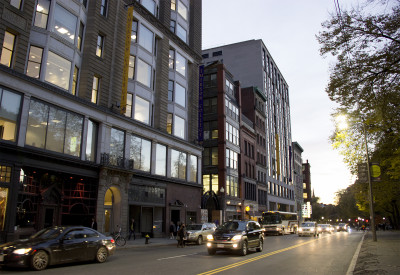
The City of Boston set a record for new housing unit completions this year, mostly due to construction projects from universities in the area.
Boston Mayor Martin Walsh spoke about the importance of meeting goals to provide safe and affordable housing for all residents.
“In order to strengthen our City and our workforce, we must meet the goals of our ambitious housing plan,” Walsh said in a Thursday press release. “I appreciate the efforts of our development community and our colleges and universities in helping us meet these challenges and we will continue working to create and maintain housing that keeps up with our City’s growth.”
A total of 3,292 net units were added in 2015, topping the previous record set in 2006, the release stated. Boston is also adding dormitory units at the highest rate since 2007.
“Housing a Changing City: Boston 2030,” the Walsh administration’s housing plan introduced last year, states how students residing off campus create problems for residents of the city, including the risk of displacement, The Daily Free Press reported Oct. 15, 2014.
“The rental housing market pressure exerted by students is intensified by the clustering of educational institutions into a few specific neighborhoods, i.e., Allston/Brighton, Fenway/Kenmore, and Jamaica Plain/Mission Hill,” the report stated. “This clustering creates concentrated local competition where investors are willing to pay premiums for housing, which can then be rented by the bed to students.”
Colin Riley, Boston University spokesman, said BU Housing has made a consistent effort to meet the city’s expectations for on-campus residences since the Student Village complex was built in 2001.
“The university, for the past 16 years, has met the city’s goal of having three quarters of students on-campus. [When] the Student Village was constructed, that’s when we obtained that goal of working with the city,” Riley said. “We have more on-campus beds than any university in the city, with nearly 12,000.”
When StuVi was created, amenities were designed to appeal particularly to upperclassmen that may otherwise seek to live off campus, Riley said.
“We have been able to retain more students during that time because the design of the Student Village apartments and suites were specifically designed to retain students and offer upper-class students housing they would desire, and the amenities to go with it, such as kitchens and common rooms,” Riley said.
Riley added that renovations are currently being made to Myles Standish Hall, one of the larger on-campus residences.
“We always continually invest in our properties,” Riley said. “Myles is a very big project and has been around for a long time, but we’re always upgrading and improving our facilities, and some of them take more investment in planning, Myles certainly because of the age and style of the building.”
The Walsh administration’s goal to keep more students on Boston’s college campuses is part of an effort to maintain affordable housing for city residents, Riley said.
“I think what they’re really addressing is the economic situation, for people to retain [housing] so that people who live and work in the city can live in the city,” he said. “The cost of housing in urban areas has been going up, but BU is not necessarily one of these schools that has increased the number of students living off campus, [the number of students living off campus] has probably reduced over the past 10 to 15 years.”
Several students recognized the pros and cons to living on and off campus.
Blaze Travis, a senior in the College of Arts and Sciences, said that he can live off campus even with his scholarship.
“[I live] off campus, it’s much cheaper. I get a scholarship from BU and I didn’t realize until my junior year that they would actually give me a stipend if I moved off campus,” Travis said. “After I did the numbers, it’s a lot cheaper to live off campus with a scholarship.”
Travis said although he moved off campus, he still feels as though he is a part of the community.
“I live in Allston now and I lived in [1019 Commonwealth Ave.], so it’s just like a block away from where I used to live, so I don’t feel like it was too big of a jump,” he said.
Codie Smith, a senior in the College of Engineering, said she feels safe living off campus.
“I live off campus because it’s my senior year and I wanted to get off campus and bring my cat. Personally, I like living off campus. It’s definitely more annoying to deal with transportation and stuff but I like it,” she said. “It feels the same.”
Ryan King, a sophomore in CAS, said although he lives on campus, he would prefer to move off.
“The amount you pay to live on campus versus the quality of life you get is substantially worse than living off campus,” he said. “I pay $12,000 a year and there’s no place in my dorm to get cold drinking water.”
King also said that he believes off-campus security is safer.
“I think off-campus is safer,” he said, “because instead of the RAs patrolling to ‘keep me safe’ by busting me for being too loud, I have the cops who are actually trying to keep people safe.”
Maisie Guzi contributed to the reporting of this article.


























































































































